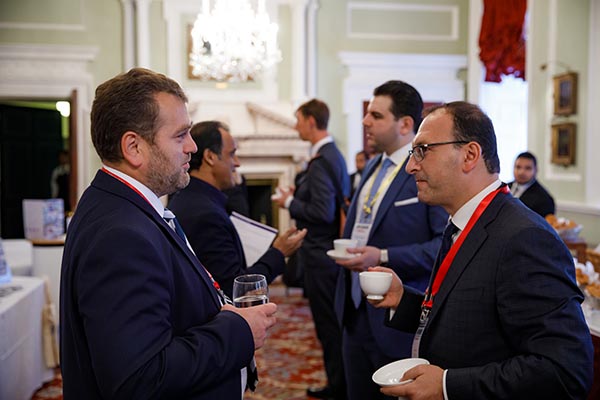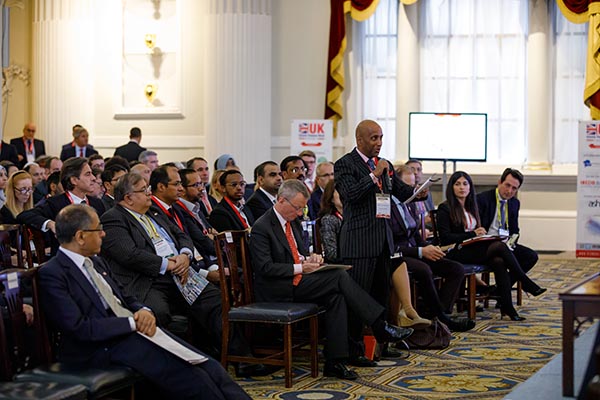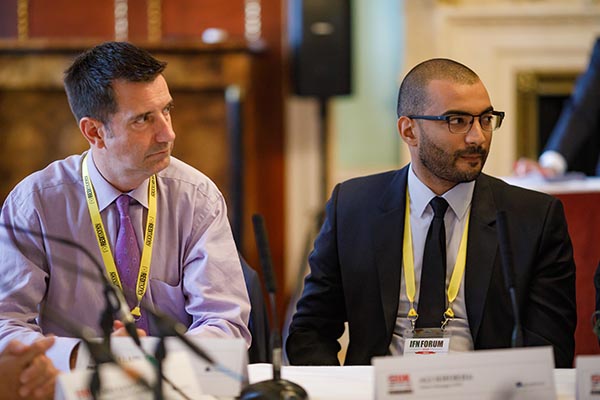Event Details
With six licensed Islamic banks and over 20 international banks offering Shariah compliant financial products, the UK’s Islamic finance industry is a favorite destination for investors, particularly for its flourishing real estate sector.
Where: Mansion House, London
When: 7th December, 2020
Apart from the banking industry, the London Stock Exchange is also one of the most active Sukuk-listing destinations, with 67 listed Sukuk and three Islamic exchange-traded funds to date. On top of this, implications from Brexit has also led the Kingdom to boost its international trade and financial relationships with existing non-EU trade partners, especially with key Islamic finance markets from the regions of the Middle East and Southeast Asia.
Last year’s UK Islamic Finance Week saw many breakthrough sessions in a week-long event, including the official launch of iE5, an Islamic economy accelerator, during IFN Fintech Huddle UK.
Conference Highlights
Responsible, Inclusive and Ethical: The Future of UK Islamic Financial Services
How can the UK Islamic financial services industry use this opportunity to leverage on its ethical lead and strengthen its position and service proposition in the wider UK market? How can Islamic finance mobilize to address the imminent challenges of the real economy and provide not just liquidity support, but solvency support to the vital SME and corporate sector? How can efforts towards responsibility, ethicality and inclusivity be extended to entice non-Muslims to take advantage of the Islamic financial services proposition? What opportunities do the UN Principles for Responsible Banking offer UK Islamic financial institutions, and what obligations and responsibilities to their stakeholders are placed on those institutions? How can we as an industry make sure this is substance over form on a permanent basis? Lastly, how can the core values of Islamic finance be further applied to sustainable and socially responsible finance and investment strategies?
Panelist: Charles Haresnape, CEO, Gatehouse Bank
Putting Islamic Finance to Work: Sustainable, Humanitarian & Green Initiatives
In the shadow of COVID-19, what role can social, pandemic and disaster recovery bonds play and how can Islamic finance solutions feature? How can Sustainable Development Goal 3 – promoting health and wellbeing – be made an achievable priority and what do SDG bonds, and potentially SDG Sukuk, offer? Beyond credit, what types of new vehicles will begin to feature in the financing of sustainable, social, humanitarian projects? What options do Islamic finance structures such as Commodity Murabahah offer social projects? Are ratings and screening technologies among the most significant changes facing sustainable finance today, and how has the sector responded? Where are the latest touch-points between Islamic finance and green and sustainable initiatives and where will we see the examples of overlap and cooperation?
Panelists:
Dr Mohammed R. Kroessin, Head of Islamic Microfinance, Islamic Relief Worldwide
Razvan Dumitrescu, Principal, Local Currency and Capital Markets Development, European Bank for Reconstruction and Development
Managing and Navigating Uncertainty: Islamic Capital Markets, Funding and Sukuk
We ask an expert panel to examine spreads, pricing and ratings and identify what factors drive these in the short to medium term. What is the likely schedule for the issue of the second UK Sovereign Sukuk? What form will the transaction take and what will it offer the UK wholesale markets? What funding options do UK Islamic financial institutions have today for satisfying Tier 1 regulatory capital requirements and liquidity management needs? What is the status of the Bank of England facility and what format will it take? In times of stress and volatility, do Sukuk offer some semblance of stability? How can the regulatory gap be bridged, particularly on cross-border Islamic finance transactions? What innovation might we see in global Islamic capital markets going forward and what structures offer issuers flexibility and efficiency?
Opportunities for Real Estate Investment in the United Kingdom
We examine current trends, developments and opportunities for Shariah compliant real estate investment into the post-Brexit UK market. What are the current demands of Shariah compliant direct investors into the UK real estate market terms of types and asset classes, and what represent potential investment targets? What are the structures used to facilitate Shariah compliant real estate investment finance in the UK? What is the potential for real estate funds and equity linked products such as REITs? Finally, what opportunities are on offer for acquisition of distressed assets, post COVID-19?
Panelist: Trevor Norman, Director – Islamic Finance and Funds Group, VG
Thinking Big: Islamic Asset and Capital Management
What can conventional asset managers learn from Islamic finance, including the use of endowment structures, agency arrangements and enhanced investment screening? What is a successful strategy to build a profitable Shariah compliant asset management business as part of a wider, global Islamic investment management industry? How is the Islamic asset management industry addressing ethical and governance issues, including screening and the use of data and artificial intelligence? What have Robo-advisory platforms achieved in terms of penetration and market share: what are crucial factors to the success of these platforms and what threat do they realistically offer to traditional asset managers? Finally, what influences the deployment of Shariah compliant capital, what do Shariah compliant institutional investors want and where do private equity, Sukuk funds, trade finance funds and others play a role?
Panelist: Zaineb Sefiani, Founder and Director, Carrera Learning
IFN Fintech Huddle: All the Techs
In which sectors and activities is Islamic FinTech activity currently most prolific? What disruption is taking place in the SME funding sector in the UK in particular? What are other areas of notable activity, including WealthTech, InsurTech and RegTech? What challenges do financial technology companies still face in terms of funding, regulation and market penetration? What more can be done by investors, accelerators, governments and regulators to assist and enable today’s financial technology companies? Where and how can FinTech play a meaningful role in key Islamic social financial activities such as Takaful, Zakat and Waqf?Panelist: Hassan Daher, CEO, Qardus
Photos & Gallery



































